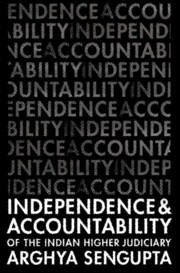Description
Independence and Accountability of the Higher Indian Judiciary
Author: Sengupta Arghya
Language: English
Subject for Independence and Accountability of the Higher Indian...:
Approximative price 121.50 €
In Print (Delivery period: 14 days).
Add to cart
Publication date: 05-2019
332 p. · 15.8x23.6 cm · Hardback
332 p. · 15.8x23.6 cm · Hardback
Description
/li>Contents
/li>Biography
/li>
The Supreme Court of India is a powerful institution at the forefront of public attention in India. It is often engaged in a bitter duel with the government on issues as diverse as the administration of cricket in India to whether liquor shops are allowed on highways. Despite such public prominence, very little attention has been paid to who the judges of the Supreme Court are, how they are appointed, transferred and removed, and what they do after retirement. This book provides an account of these four facets of judicial functioning and analyses the processes in operation today. It argues that each of these four aspects gives rise to significant concerns pertaining to judicial independence, accountability, or both. Its main argument is that both judicial independence and accountability are necessary for 'an effective judiciary', and these two values are not in conflict with each other as is commonly assumed.
Acknowledgements; Table of abbreviations; Table of cases; Table of statutes; 1. Introduction; Part I. The Indian Experience: 2. Pre-tenure questions: appointments to the higher judiciary; 3. In-tenure questions: mechanisms for judicial discipline; 4. Post-tenure questions: post-retirement appointments of judges by government; Part II. A Conceptual Analysis: 5. Judicial accountability; 6. Judicial independence; 7. In search of an effective judiciary: a doctrinal reconciliation of judicial independence and accountability; Part III. Typing the Strands: 8. Harmonising judicial independence and judicial accountability in India; 9. Conclusion: a reform proposal for the Indian higher judiciary; Epilogue: the moment the judiciary came out; Appendix: post-retirement employment of judges in government appointed positions; Bibliography; Index.
Arghya Sengupta is Research Director at the Vidhi Centre for Legal Policy. He is an alumnus of the National Law School of India University and the University of Oxford, and is a Rhodes Scholar.
© 2024 LAVOISIER S.A.S.




